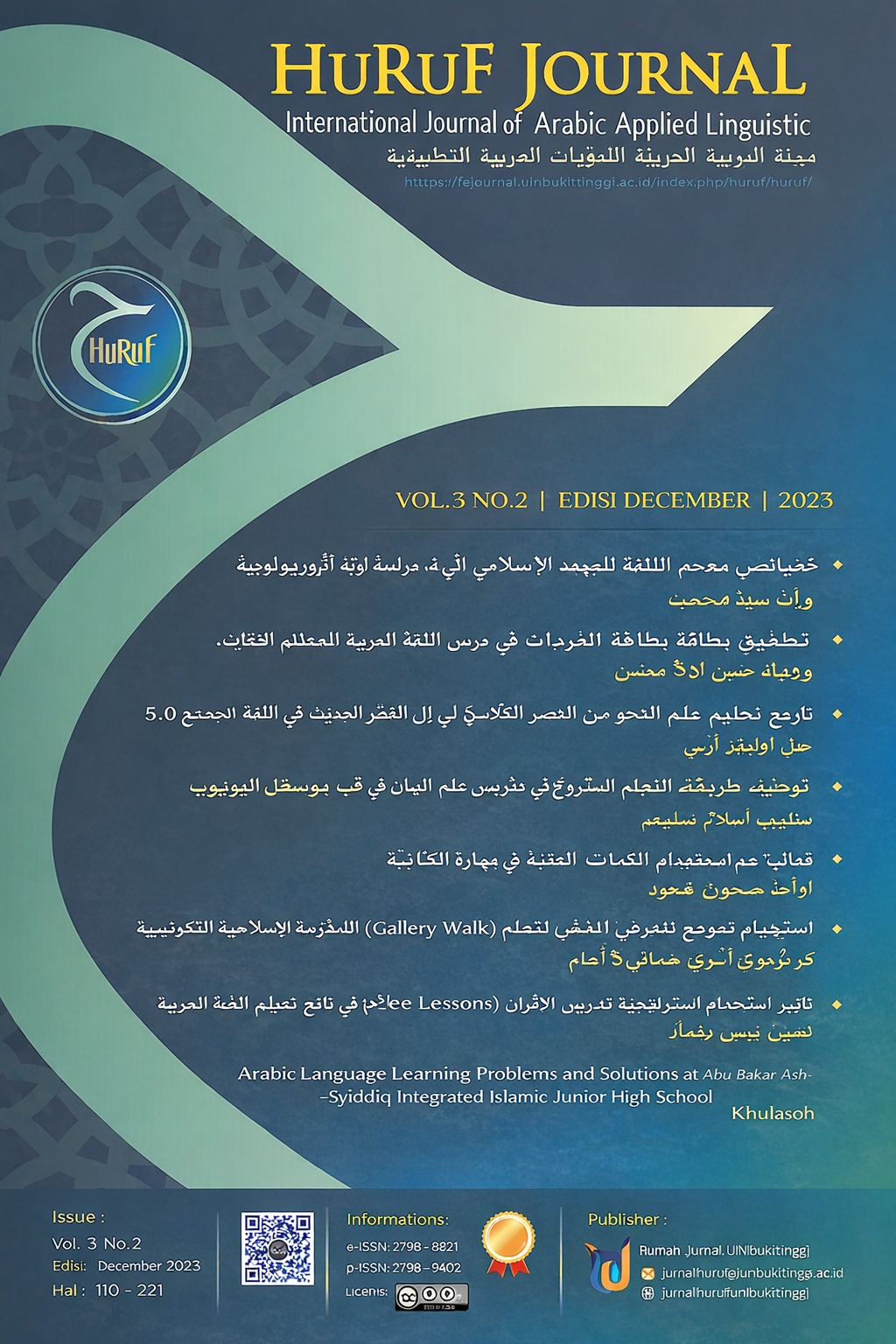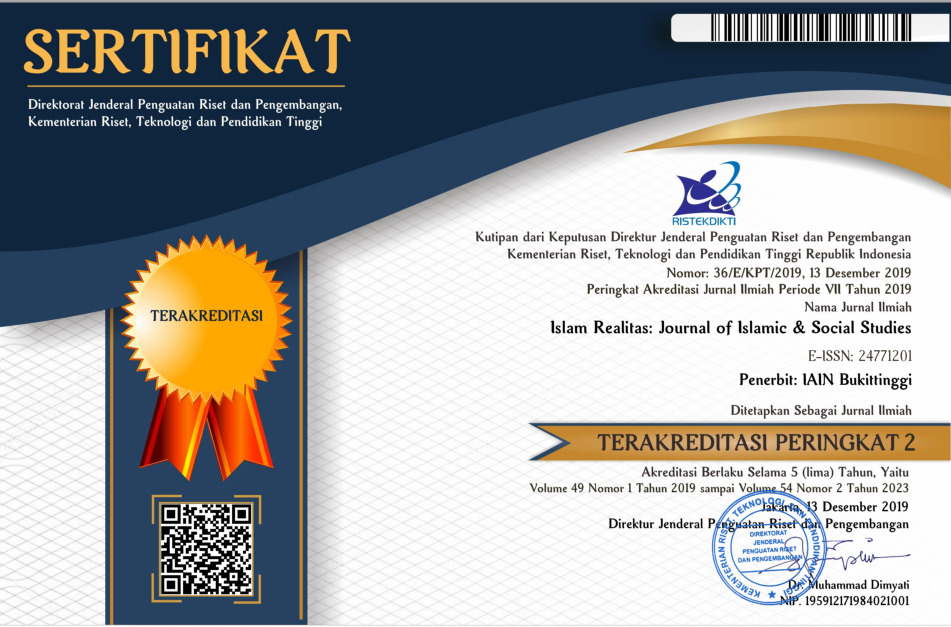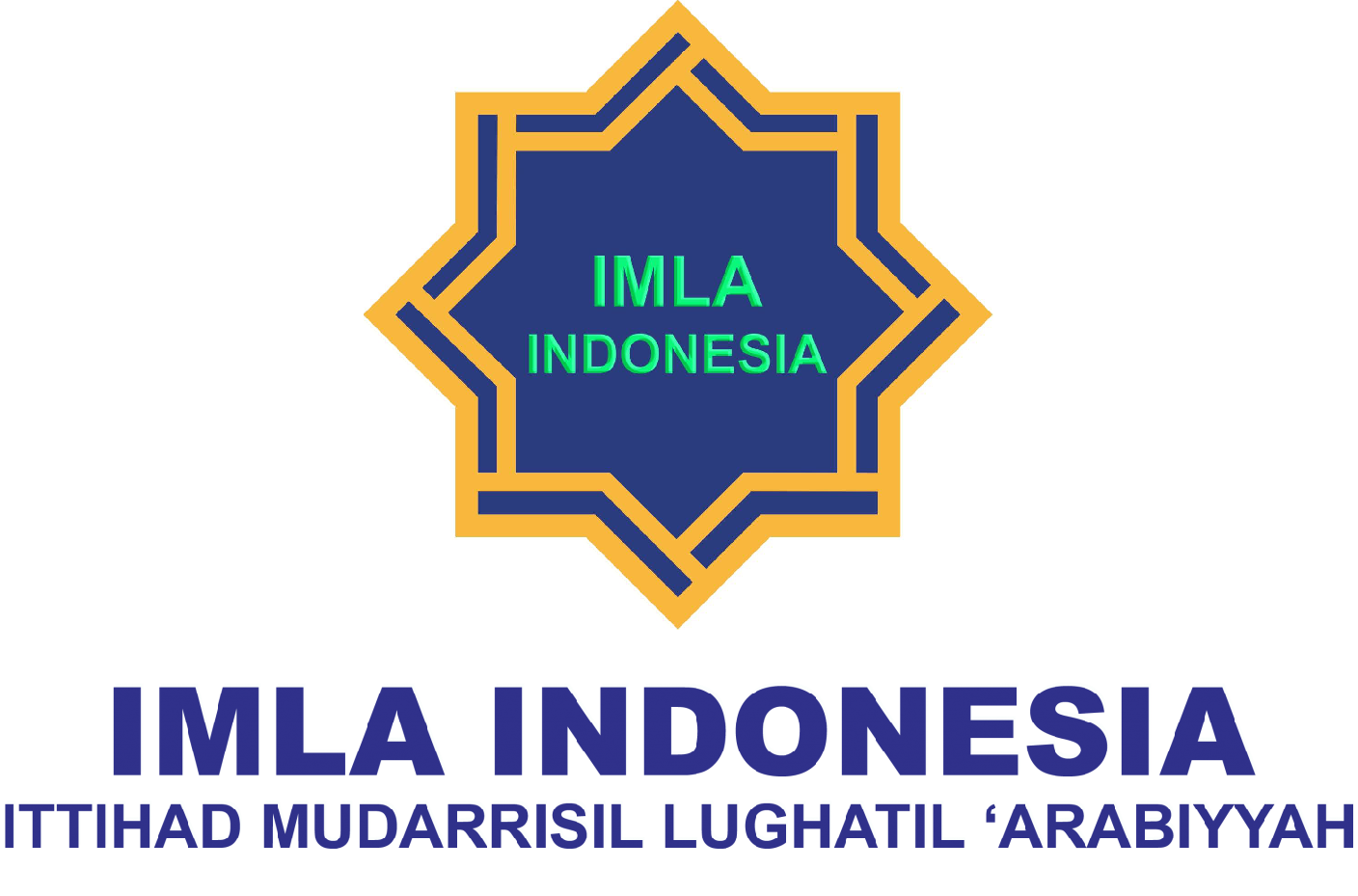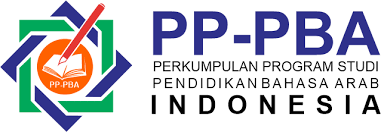TÄrikh TaÊ¿lÄ«m Ê¿Ilmi al-Naḥwi min al-Ê¿Aá¹£ri al-KalÄsÄ«kiy ila al-Ê¿Aá¹£ri al-ḤadÄ«th fi al-MujtamaÊ¿ 5.0
DOI:
https://doi.org/10.30983/huruf.v3i2.7473Keywords:
History, Nahwu, Arabic LearningAbstract
This article aims to provide historical information on the development of nahwu science from classical times at the beginning of the emergence of Islam to modern times in the 5.0 era. The 5.0 era refers to the development of information and communication technology that changes the learning paradigm significantly. This research uses historical analysis methods and literature studies to collect data about the history of science and its development until the modern era. The results of this research are expected to provide in-depth insight into the history of science and its development accompanied by examples of learning systems and methods such as the Tanya Zaid chatbot system, Arruz Applications, and electrical methods in learning the era of society 5.0. This will help develop more effective and relevant learning methods to meet the increasingly complex learning needs of science and technology that continues to evolve.
تهد٠هذه المقالة لتقديم المعلومات التاريخية عن تطور علم النØو من العصور الكلاسيكية ÙÙŠ بداية ظهو الإسلام إلى العصر الØديث ÙÙŠ عصر الخامسة. يشير عصر 5.0 إلى تطوير تكنولوجيا المعلومات والاتصالات التي تغير نموذج التعلم بشكل كبير. يستخدم هذا البØØ« أساليب التØليل التاريخي ودراسات الأدبيات لجمع البيانات Øول تاريخ العلم وتطوره Øتى العصر الØديث. ونتائج هذا البØØ« نظرة متعمقة ÙÙŠ تاريخ العلوم وتطورها مع أمثلة الأنظمة وأساليب التعلم مثل نظام روبوتات الدردشة إسأل زيد وتطبيقات أروز والأساليب الكهربائية ÙÙŠ تعلم عصر المجتمع 5.0. وسيساعد ذلك على تطوير طريقات التعلمية أكثر Ùعالية وملاءمة لتلبية اØتياجات التعلم المتزايدة التعقيد للعلوم والتكنولوجيا التي تستمر ÙÙŠ التطور.
References
al-Hasyimi, Ahmad, Qawaid Al-Asasiyyah Li Al-Lughat Al-Arabiyyah (Beirut: Dar al-Fikr)
al-Lughah, Al-Munjid fi, DÄr Al-Masyriq, cetakan 44 (Beirut, 2011)
Alfaini, S, ‘Problematika Dan Solusi Pembelajaran Daring Bahasa Arab via WhatsApp Group’, 2021.
Atsari, M R, M S A K Mardilan, S Bahri, and M U Siregar, ‘Rancangan Aplikasi Chatbot Telegram “Tanya Zaid†Sebagai Media Pembelajaran Nahwu’, UIN Sunan Kalijaga Yogyakarta, 5 (2023).
Evanirosa, Metode Penelitian Kepustakaan (Library Research) (Bandung: Penerbit Media Sains Indonesia, 2022)
Fadli, Abdul Hadi, Marâkiz Ad-Dirâsat An-Nahwiyyah (Yordania: Makatabah al Manar, 1986)
Ibda, Hamidullah, ‘Penguatan Literasi Baru Pada Guru Madrasah Ibtidaiyah Dalam Menjawab Tantangan Era Revolusi 4.0’, Journal of Research and Thought of Islam Education, 1.1 (2018)
JinnÄ«, Ibnu, Al-KhasÄish (Kairo: DÄr al-Hadits, 2008)
Kamal, M, ‘Mazhab-Mazhab Sintaksis Bahasa Arab “Nahwuâ€â€™, Jurnal Bina Ilmu Cendekia, 2
Masruroh, Ninik, ‘Pendidikan Agama Islam Berbasis IT (E-Learning), Efektifkah?’, Jurnal Studi Islam Pancawahana, 9.2 (2014)
Na’im, Zaedun, ‘Pembelajaran Berbasis Problem Solving Era Society 5.0 Di Perguruan Tinggi’, in Strategi Dan Metode Pembelajaran Era Society 5.0 Di Perguruan Tinggi, ed. by Yudi Septi (Kuningan, 2022).
Nastiti, Faulinda, and Aghni Abdu, ‘Kajian: Kesiapan Pendidikan Indonesia Menghadapi Era Society 5.0’, Edcomtech Jurnal Kajian Teknologi Pendidikan, 2020.
Ni’mah, Umi Nurun, ‘Dasar-Dasar Penyusunan Nahwu Syauqi Dhaif (Kajian Episte Mologi Atas Karya Syauqi Dhaif Tajdid an-Nahwu Dan Taisir an-Nahwu at-Ta’limy Qadiman Wa Haditsan)’, Adabiyyat Jurnal Bahasa Dan Sastra Arab, 6.1 (2007).
Raswan, ‘Pengaruh Metode Pembelajaran Eklektik Terhadap Hasil Belajar Bahasa Arab Siswa’, Arabiyat : Jurnal Pendidikan Bahasa Arab Dan Kebahasaaraban, 5.1 (2018).
Rouf, Ahmad, ‘Reaktualisasi Dan Kontekstualisasi Kearifan Lokal Dengan Manhaj Global: Upaya Menjawab Problematika Dan Tantangan Pendidikan Di Era Society 5.0 Dan Revolusi Industri 4.0’, in Seminar Nasional Pascasarjana 2019, 2019
Sasikirana, Yusuf Tri Herlambang Vania, ‘Urgensi Merdeka Belajar Di Era Revolusi Industri 4.0 Dan Tantangan Society 5.0’’, -Tech: Jurnal Ilmiah Teknologi Pendidikan, 8.2 (2020).
Sulhadi, Abrar, Media Pembelajaran Bahasa Arab Berbasis Android Dengan Menggunakan Aplikasi Arruz Untuk Penguasaan Nahwu Di Jurusan Sastra Arab UIN Sunan Kalijaga (Jogjakarta: El-Tsaqafah, 2020)
Thu’aimah, Rusydi Ahmad, and Muhammad al-Sayyid Manna’, TadrÄ«s Al-Arabiyyah Fi Al-Ta’lim Al-‘Am; Nazhariyyah Wa TajÄrib, Cetakan 1 (Kairo: Dar al-Fikr al-Araby, 2000)
Umro, Jakaria, ‘Tantangan Guru Pendidikan Agama Islam Dalam Menghadapi Era Society 5.0’, Al-Makrifah, 5.1 (2020).
Downloads
Published
How to Cite
Issue
Section
Citation Check
License
Copyright (c) 2023 Ramadhan Jabal Primadana, Bagus Maulana Achmad Fahmi, Zainal Muttaqin

This work is licensed under a Creative Commons Attribution-ShareAlike 4.0 International License.
Authors who publish with this journal agree to the following terms:
- Authors retain copyright and grant the journal right of first publication with the work simultaneously licensed under a Creative Commons Attribution-ShareAlike 4.0 International Licensethat allows others to share the work with an acknowledgment of the work's authorship and initial publication in this journal.
- Authors are able to enter into separate, additional contractual arrangements for the non-exclusive distribution of the journal's published version of the work (e.g., post it to an institutional repository or publish it in a book), with an acknowledgment of its initial publication in this journal.
- Authors are permitted and encouraged to post their work online (e.g., in institutional repositories or on their website) prior to and during the submission process, as it can lead to productive exchanges, as well as earlier and greater citation of published work (See The Effect of Open Access).





